
By Lauren Puckett
Pet insurance may seem unnecessary to many caregivers. It’s one more monthly cost that you don’t need, right? But for guardians of pets with major health issues, pet insurance may be worthwhile and provide some peace of mind. The catch is that you don’t know if or when your pet may experience a health problem – and you need to have your insurance in place before they do or that problem likely won’t be covered.
To help you decide whether pet insurance is right for you, let’s look at the essentials:
1 – Not every insurance company or plan is the same
You’ll want to research different pet insurance companies and the plans they offer. A good place to start is each company’s website. Most of them will allow you to get a free pet insurance quote if you don’t mind the promotional email you will then receive. Consider these questions:
- How extensive is the coverage? Does it cover chronic conditions? Genetic conditions? Accident and illness? Pre-existing conditions?
- Is there an option to cover wellness/preventive care like vaccinations?
- What is the monthly premium and can it be customized to meet your budget?
- What is the annual limit (the total amount you can get reimbursed in one year)?
- What is the deductible (the amount you need to pay before you get reimbursed)?
- What is the reimbursement percentage (how much the insurance company will pay you)?
2 – Many plans do not cover pre-existing issues
It’s best to sign your pet up for insurance either before or shortly after you bring them home. This is because most plans will not cover pre-existing issues (anything that arose prior to your pet being enrolled in pet insurance).
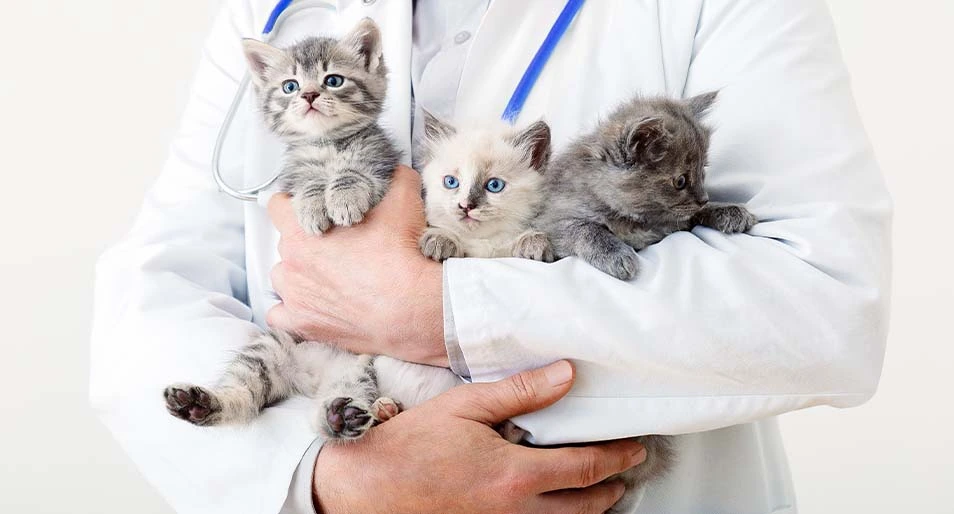
3 – There is often a waiting period
This is the window between when you sign up and when you can submit your first claim. Keep this in mind when you’re bringing a new pet into your life. As mentioned above, you may need to enroll in pet insurance before you get your pet. The duration of the waiting period will vary by insurance company. Waiting periods for illnesses are typically 14-30 days, while waiting periods for accidents are 1-15 days.
4 – Claims are paid after the fact
Most pet insurance does not function like health insurance for people, where the insurance company pays the doctor directly. In most cases, you pay your veterinary bill in full and then submit your pet insurance claim. Once the claim is approved, your insurance will reimburse you via check or direct deposit.
Keep in mind that most plans do not reimburse 100 percent of the vet bill, even when it is fully approved; they have pre-set reimbursement percentages for each health condition. This is something you’ll want to look at as you are deciding which insurance plan to go with.
5 – You can visit any veterinarian
There is no “in network” or “out of network” with pet insurance. You can visit any licensed veterinarian, including specialists and emergency clinics.
Sources:
https://www.marketwatch.com/guides/pet-insurance/pet-insurance-with-no-waiting-period
https://www.aspcapetinsurance.com/resources/pet-insurance-beginners-guide
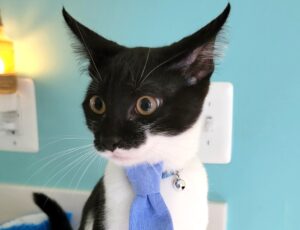
Every year, the Clear the Shelters campaign lights up the nation, creating a powerful wave of compassion and action for our furry friends. Running from August 10 to September 10, this year’s campaign was no different, bringing a surge of support and a renewed focus on pet adoption and donations. Since its inception in 2015, Clear the Shelters has been a beacon of hope, helping more than 1 million pets find their forever homes.
The Humane Society of Loudoun County (HSLC) proudly joined the nationwide effort, participating in multiple adoption events throughout the campaign. Thanks to the generosity of our donors, we were able to offer special incentives to encourage adoptions. Adult cats and dogs had their adoption fees waived, while a special “BOGO” deal was available to help bonded kitten pairs find homes together.
Among the many uplifting adoption stories, one stands out as a shining example of the campaign’s success. At the CatVideoFest event hosted at the Alamo Drafthouse in Ashburn, a potential adopter came to meet three remaining kittens from the Kittenpalooza litter. He was so moved by the trio’s bond that he decided not to separate them. In a rare and heartwarming decision, he adopted all three kittens together. It’s moments like these that make the hard work and dedication surrounding adoption efforts so rewarding.
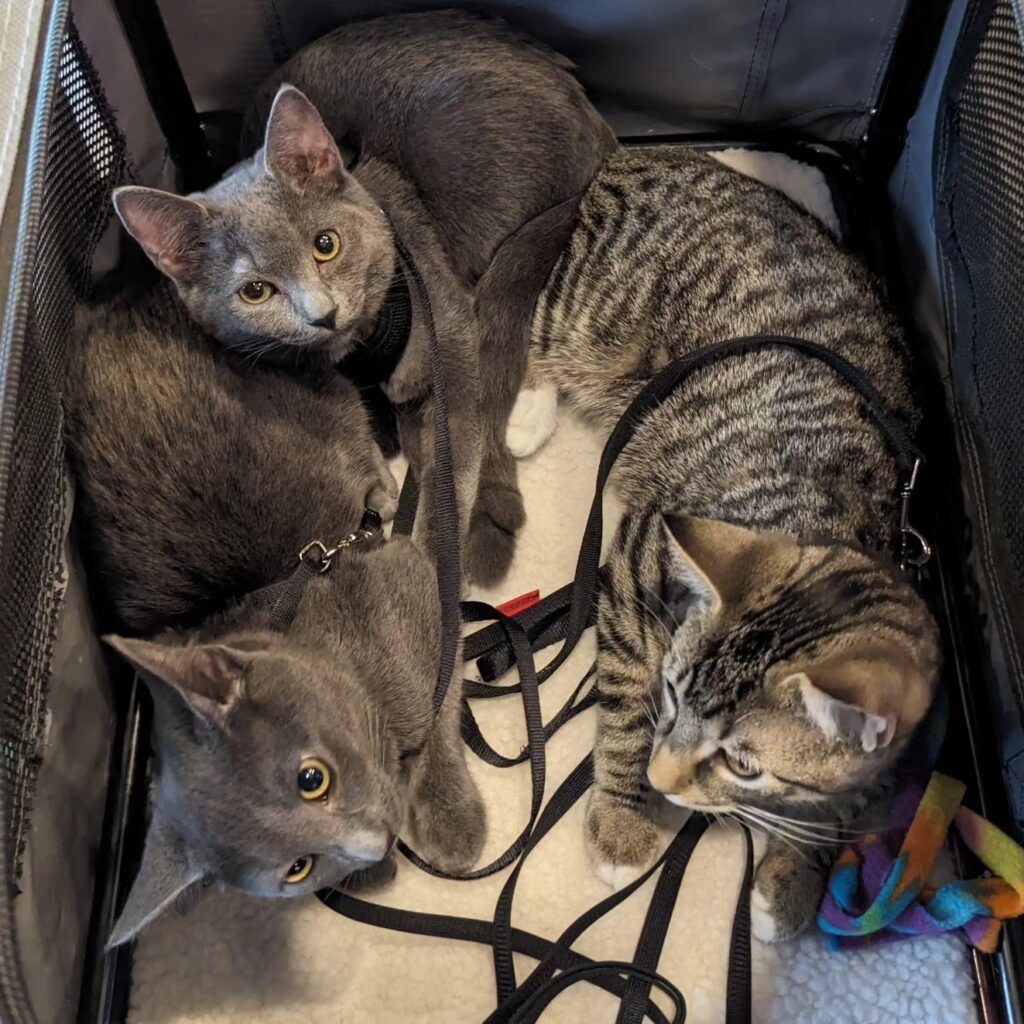
In total, HSLC successfully placed 22 animals into loving homes during the campaign. Each adoption story is a testament to the power of community support and the difference it can make in the lives of the littlest among us.
A huge thank you to everyone who supported the campaign, whether through donations, volunteering, or adopting. Your contributions are making a lasting impact on the lives of so many pets and their new families. Here’s to many more happy endings and the continued success of Clear the Shelters!

By Liz Bresnahan
If you are an animal lover, you know that a pet’s love is priceless. Life’s simple moments are that much sweeter. Maybe it is your cat’s calm purr as she keeps you company while reading or your dog’s excitement on walks that makes a routine stroll around the neighborhood anything but mundane. Pets provide so much joy and many consider them an integral part of the family.
If you are thinking about adopting a pet, the Humane Society of Loudoun County (HSLC) encourages you to consider an adult animal. While you ultimately have to do what is best for your household, many families who have adopted an adult dog or cat are so glad they did. Here are a couple of points to think about if you are considering adopting an older companion animal.
Time: Quality over quantity
Adopting an adult dog or cat may mean that you do not have as many years to spend with them as you would a puppy or kitten. However, the time you do have will be that much more cherished. In certain cases, rescued animals may not have had an ideal life. However, because HSLC animals are placed in safe and loving foster homes prior to adoption, they can start to heal from their past, if needed. Once adopted, you have the unique privilege of watching your pet continue to blossom into a more happy, trusting, and confident companion. And because you are helping your dog or cat rewrite their story, you can often expect them to show you unconditional love and loyalty in return.
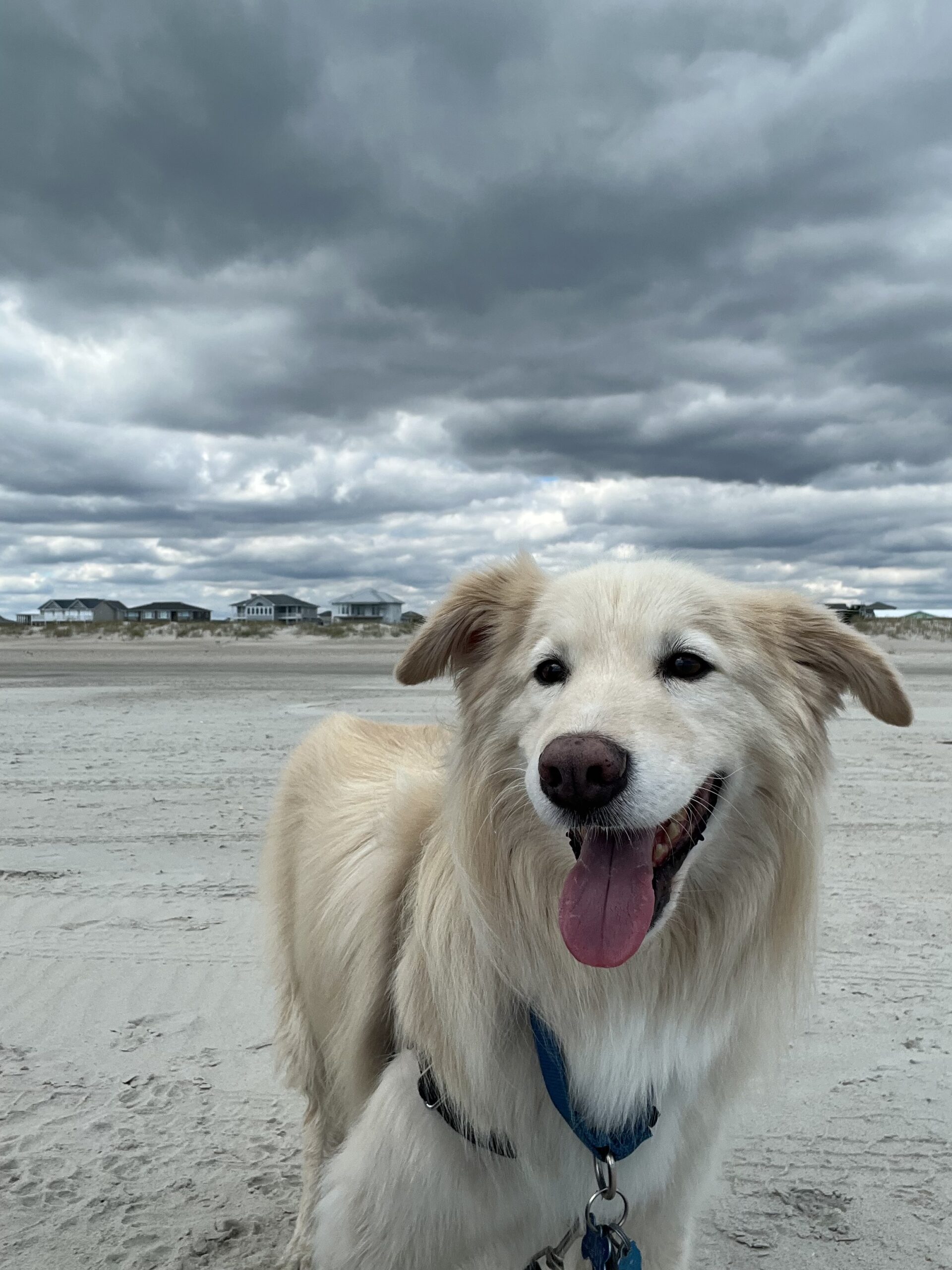
Training: Basics are covered
Adult dogs and cats are usually potty-trained which is definitely a point in their favor. Many adoptable dogs will also know basic commands. But, if a dog needs additional training, know that you may be able to teach an old dog new tricks if you are dedicated to working closely with them. And, when you are successful, it will be so rewarding that you have directly supported the growth and development of your furry companion.
Temperament: No surprises
One of the biggest benefits of adopting an adult animal is that you know what you’re getting. You don’t have to wonder how big they will get or how their personalities will turn out. And, with adults, you are often getting an animal with a calmer temperament. For this reason, adults can be great starter pets for families with children.
Ready to adopt? Check out the wonderful adult animals that are available for adoption right now. Rest assured, HSLC will work with you to find the right animal to fit your household and lifestyle.
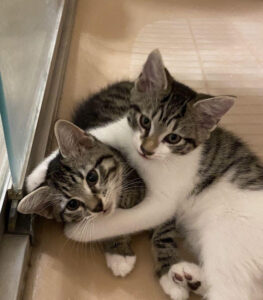
By Kailyn Carr
When it comes to things we like or love, we tend to live by the philosophy that if one is good, two is even better. Why stop at one piece of chocolate when you could have two? Same goes for cats. What could possibly be better than two best friends instead of one? Though adopting in pairs may not be for everyone, the pros—including twice the love—often outweigh the cons.
Benefits of Adopting in Pairs
Starting with kittens (we’ll get to adults in a moment), here are seven ways fur-babies benefit from a twosome according to the Kitten Lady, Hannah Shaw.
- Learn by Observation – Kittens learn by observation and will more quickly pick up skills like using the litter box or grooming if they have another kitten or cat to teach them.
- Focus Play Aggression – Having a friend means they can take out their play aggression on one another (instead of on you.) They’ll also teach each other good boundaries about biting and scratching.
- Entertain & Enrich – When your kitten has a buddy, they’ll always be entertained, active, and enriched. And a happy cat makes a happy home!
- Keep Out of Trouble – One mischievous kitten can be destructive if left alone, but two kittens tend to keep each other occupied and out of trouble.
- Easier Intro to Adult Cat – If you have an adult cat at home, two new kittens may be easier to introduce into your family than one. While one kitten may nag an older cat, two kittens will keep each other company while the older cat watches from a distance.
- Comfort in Friendship – Having a pal will help your kitten settle into a new home. Just like humans, kittens have an easier time feeling comfortable trying something new if they’ve got a friend to do it with them.
- Bonded Pair Adoption – It’s easier to adopt a bonded pair than it is to introduce a new cat later. Adopting a dynamic duo ensures that you’ll have a harmonious home for years to come!
Adopting in pairs also has a positive impact on animal rescue groups like the Humane Society of Loudoun County. By adopting two animals, you free up two slots in a foster home or shelter which allows the rescue to save two more lives.
Bonded Pairs
A bonded pair contains two cats that have a special relationship. While kittens often are bonded early in life with siblings, close relationships between cats can occur at any age. This is due to their natural instinct as social animals to form a pack. These bonds often develop between mother and offspring and even individuals with no familial relationship (true best friends!)
Once a bonded pair is observed, caretakers preserve the relationship by housing the cats together and encouraging an adoption into the same home. Maintaining the bond between two cats is essential. When apart, one or both cats can become stressed, anxious, or even depressed without the other around.

Spotlight on a Purr-fect Pair: Ripley and Winston
One of our pawsome fosters, Kelly, fondly recalls her experiences fostering (and eventually adopting) mama Ripley and her son Winston. Here is what she had to say:
“Winston was always very attached to his mom and we’re so glad we didn’t separate them. They are so funny together–they roughhouse all the time and run around the house chasing each other. It keeps Ripley active as she ages. Plus, if Winston was an only cat, he would constantly be making mischief for us. Having another cat gives him an outlet for his energy. Of course, it’s also comforting to know they have each other when we’re not home. I truly think they’re happier because they always have a buddy.”
If you are interested in adopting one or more cats, visit the Humane Society of Loudoun County’s current clowder of adoptable cats here. Once you find your next family member(s), be sure to complete an application to start the adoption process.

Each year, over 10 million pets are lost in the United States. However, many are found when the owners take swift and necessary action. Summer can be a particularly scary time for pets who don’t respond well to fireworks and other loud noises or find themselves in strange places due to family travel. For these reasons, July is Lost Pet Prevention Month. I caught up with one of the Humane Society of Loudoun County’s most active volunteers, Jennifer Reed, who shared some useful tips she has picked up from her years of experience getting pets home safe and sound.
In preventing lost pets, owners should make sure to keep their pet safely quartered in the home when there are loud noises nearby such as fireworks, construction, or thunder. These disturbances can send pets into ‘flight mode’ and activate survival tactics that cause them to run for their lives. When this happens, the pet will likely be in a frenzy and not respond to people calling their name.
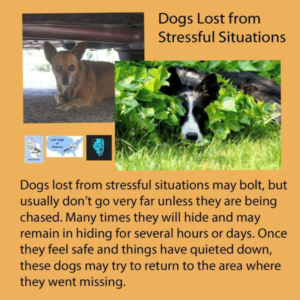 If you lose a beloved pet, Jennifer suggests placing 100+ flyers within a 2-4 mile radius of the missing area as quickly as possible. Flyers should include only the most important and clearest information, especially a line of direct contact (such as a cell phone number). The flyers should lead with “LOST DOG/CAT” in bold and large letters, a recent photo of the pet and employ a simple, uncluttered design. If space allows, add “Do not chase or call out” and “Please report sightings right away”.
If you lose a beloved pet, Jennifer suggests placing 100+ flyers within a 2-4 mile radius of the missing area as quickly as possible. Flyers should include only the most important and clearest information, especially a line of direct contact (such as a cell phone number). The flyers should lead with “LOST DOG/CAT” in bold and large letters, a recent photo of the pet and employ a simple, uncluttered design. If space allows, add “Do not chase or call out” and “Please report sightings right away”.
 Another tool to use are Community Facebook groups where you can relay information about your lost pet and allow members of the community to share it and directly comment with any useful information. Jennifer also recommends reaching out to local shelters and informing them of the missing animal. You can make a report with the Loudon County Animal Services at 703-777-0406 or reach out to local animal tracking groups such as Dogs Finding Dogs or Full Tilt Tracking once the first steps to relocate the pet are taken.
Another tool to use are Community Facebook groups where you can relay information about your lost pet and allow members of the community to share it and directly comment with any useful information. Jennifer also recommends reaching out to local shelters and informing them of the missing animal. You can make a report with the Loudon County Animal Services at 703-777-0406 or reach out to local animal tracking groups such as Dogs Finding Dogs or Full Tilt Tracking once the first steps to relocate the pet are taken.
As you wait for information to come in, create an action plan to implement once your pet is sighted. This plan should include establishing a feeding station and feeding routine to keep the pet in the area spotted so that trapping or catching the animal is possible. Be ready to monitor the feeding station with a surveillance camera like game cameras used by hunters. That way, you will know when and if the pet is still in the area and coming to eat.
Although all of these methods are effective and essential, the absolute best way to find a missing pet is to be ahead of the curve and get it microchipped when you adopt. Microchipping allows your veterinarian’s office to look up your pet’s unique ID number. Jennifer adds that you should also ensure that your personal information in the microchipping database remains up-to-date.
Lastly, if you find a missing pet, please bring it to a vet’s office to see if he/she is microchipped.
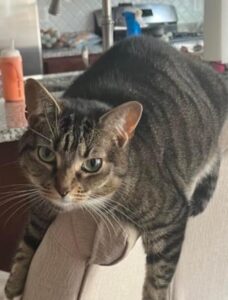
For weeks, Zozo had been a mysterious visitor to one of HSLC’s community cat sites, captivating volunteers with her elusive nature. Over time, concerns grew that Zozo might be pregnant. So, the focus of the Zozo’s care shifted from feeding to trapping and transporting her to a veterinarian.
So, two dedicated volunteers embarked on a mission to capture Zozo so she could be examined. The task was not easy. Zozo evaded capture with the skill of a seasoned escape artist. Yet, the volunteers persisted until, finally, their patience and perseverance paid off.
In a Caring Foster Home
After her vet visit, Zozo was taken under the wing of one of HSLC’s most experienced fosters. It didn’t take long for her to realize that Zozo wasn’t just any stray cat—she was friendly, social, and clearly accustomed to human company. A feeling began to stir among the volunteers that Zozo might already have a family desperately searching for her.
Their suspicions were confirmed when the foster decided to scan Zozo for a microchip—a simple procedure that would potentially reunite her with her rightful owners. And there it was, a tiny chip confirming what they had hoped for: Zozo had a family, and they had been searching for her for eight agonizing months.
The Long-Awaited Reunion
The reunion that followed was nothing short of emotional. The once-worried faces of her family were now filled with smiles, so grateful that their furry friend had found her way back home.
The story of Zozo is a powerful reminder of the importance of microchipping. It was a small but mighty chip that made a world of difference, bridging the gap between lost and found, despair and elation. It is also a reminder of the critical role HSLC’s Community Cat Program plays in reuniting lost pets with their families.
If you would like to make a life-saving difference by becoming a cat trapper or colony caretaker, please complete a volunteer application today!

Did you know that dogs and cats do not sweat like humans? Their main sweat glands are located on their paw pads and are not very effective at cooling them off. With summer now upon us, it is important to understand how hot weather affects our pets and how we can help them stay cool.
First, keep your pets out of the heat. This may be difficult for dogs. Most love the outdoors so much, they may not ask to come inside, even when in distress. If unable to keep them in an air conditioned environment, be sure to provide cool shade or shelter for your pets. Clean, cool water should always be accessible to pets that spend time outdoors during summer months. Note that, effective July 1, 2020, a new Virginia law went into effect preventing tethering outside during extreme weather.
 Take your dog on walks at dusk or dawn, when it is light enough to be seen by others, but still cool enough for a walk. Check the pavement you are walking on with the back of your hand. If your hand burns after a few seconds of contact, so will your dog’s foot. If it is too hot for you, it is much too hot for your pet.
Take your dog on walks at dusk or dawn, when it is light enough to be seen by others, but still cool enough for a walk. Check the pavement you are walking on with the back of your hand. If your hand burns after a few seconds of contact, so will your dog’s foot. If it is too hot for you, it is much too hot for your pet.
To cool down, dogs will often pant to rid themselves of excess body heat. Panting is normal for most dogs but be aware of the signs of abnormal panting. Cats tolerate hot weather a little better than dogs but can suffer from heat stroke. They often choose lying in cooler areas, drinking cool water, and adjusting their body positions.
If you notice your pet is overheating, gradually reduce their body temperature. Use ice packs, cold towels, or apply cool (not cold) water to the head, neck and chest, let your pet drink small amounts of cool water or lick ice cubes and move the pet into shade or air-conditioning. NEVER try to quickly cool a pet by dunking them in cold water. This can drop their body temperature too quickly and send them into shock.
Contact your vet immediately if your pet shows any of the following signs:
- Heavy panting
- Glazed eyes
- Rapid pulse
- Vomiting
- Fever (the normal range in dogs is 101-102 degrees, cats is 99.5-102.5 degrees)
- Unsteadiness or a staggering gait
- A deep red or purple tongue
Lastly, never leave pets in a parked car. Even on cool days, such as 70 degrees, a car’s internal temperature will jump to 90 degrees in 10 minutes and over 110 degrees within an hour. At 85 degrees, the car will reach 102 degrees in 10 minutes, continuing higher with more time. On 90 degree days, the car will quickly escalate to over 110 degrees. Cracking windows does not prevent a car from getting dangerously hot, even in cool temperatures.
For additional information on keeping your pets safe and comfortable during warm weather, please click on the following link: AMVA Warm weather pet safety

By Lauren Puckett
When there are available fosters, The Humane Society of Loudoun County (HSLC) rescues animals from overcrowded shelters in other parts of the state. How do they make their way to HSLC? Through our dedicated transport volunteers, of course! These volunteers pick up cats and dogs at risk of euthanasia and bring them to Loudoun County until they can be adopted.
We spoke with first-time animal transporter, Tom Malloy, to get a better understanding of this important role. (Be sure to check out the photos after the interview!)
What does an animal transport volunteer do?
The animal transport volunteer is responsible for providing safe transport for animals between locations. When a transport job arises, HSLC contacts you to see if you are available. If so, you receive instructions as to the pick-up and drop-off points, your points of contact, and any other information relevant to the trip. You will also be provided with the necessary carriers and supplies.
Do you need to have a truck or SUV to transport animals?
No, you don’t need a big vehicle to do the job. Usually you are just transporting one or two dogs or cats, and they will travel in some sort of carrier. There have been times when a volunteer with a smaller car needed to improvise. Recently, a transporter found that the dog he was picking up was in a carrier too large to fit in the passenger compartment. Instead, the dog (secured with a leash) travelled happily while sitting in the front passenger seat.
What type of time commitment does animal transport entail?
Transporting animals long distances is an infrequent need, maybe one or two trips per month. But that is divided between available volunteers. You may only be called upon to do it a few times a year. For my first trip, the pick-up was in Staunton, Virginia. It was a two-hour drive down, two hours back, and then some time in the middle and the end to transfer the animals.
Note: HSLC also needs volunteers for local transport. Apply today!
What types of animals have you transported?
I’ve only transported two dogs, Chip and Dip, brothers who were a few months old.
Were there any problems or incidents?
Not any major problems. Chip and Dip had just completed a two-hour drive to Staunton from southwestern Virginia, so they were pretty subdued. However, just as I was pulling away, Dip took a bathroom break in his carrier cage. Fortunately, I was able to pull into a gas station parking lot and do a quick clean-up with the supplies I had brought for just such an occasion. The rest of the trip was incident free. It was a lesson learned for me as well. We’re a cat household, so I am not as familiar with “dog needs.”
What do you like about transporting animals?
It is rewarding knowing that I had saved two puppies and given them a chance at a wonderful new life.
Do you have any advice for people thinking about volunteering for animal transport?
I think if you are looking for an opportunity to try out volunteering with HSLC, animal transport is a great entry point. It helps if you have a somewhat flexible schedule to accommodate unexpected requests.
Interested in volunteering as an animal transporter? Submit a volunteer application on the HSLC website.

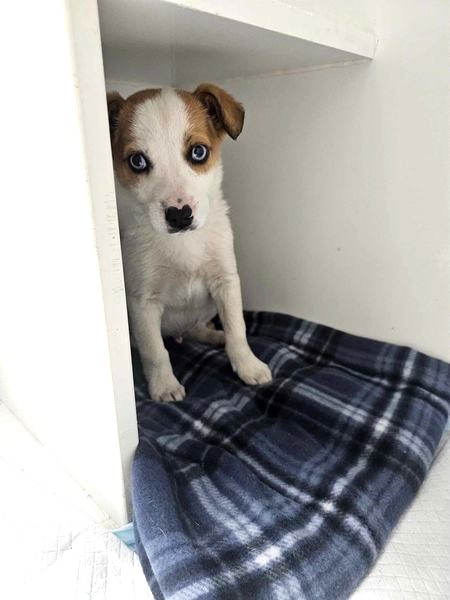
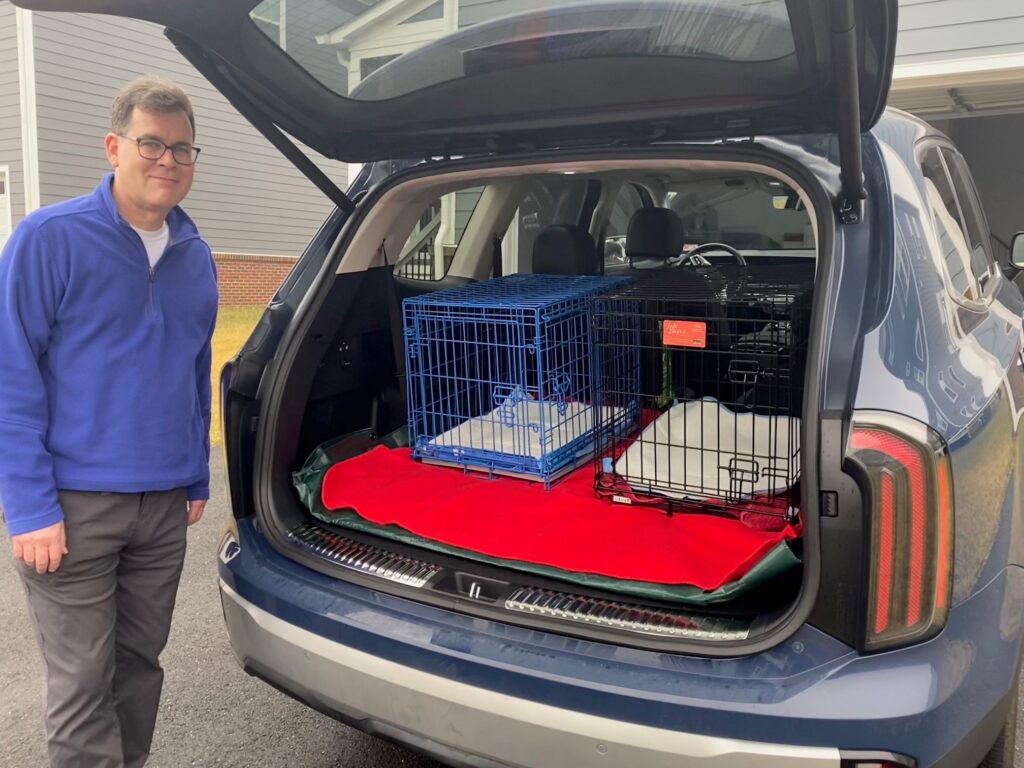
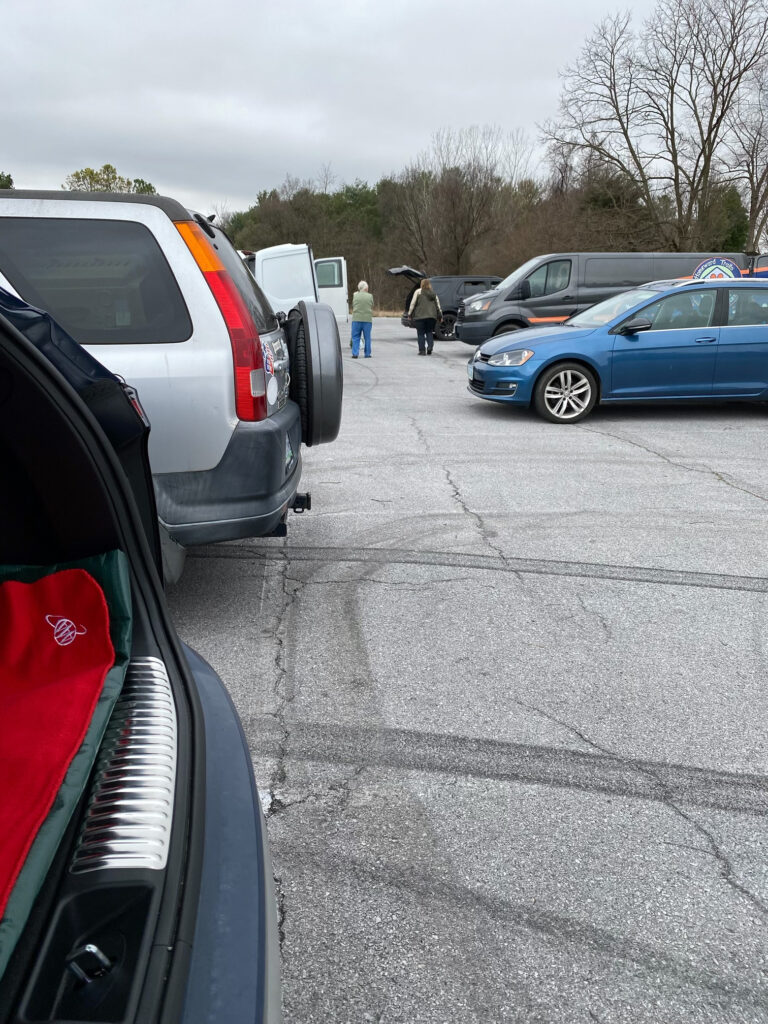

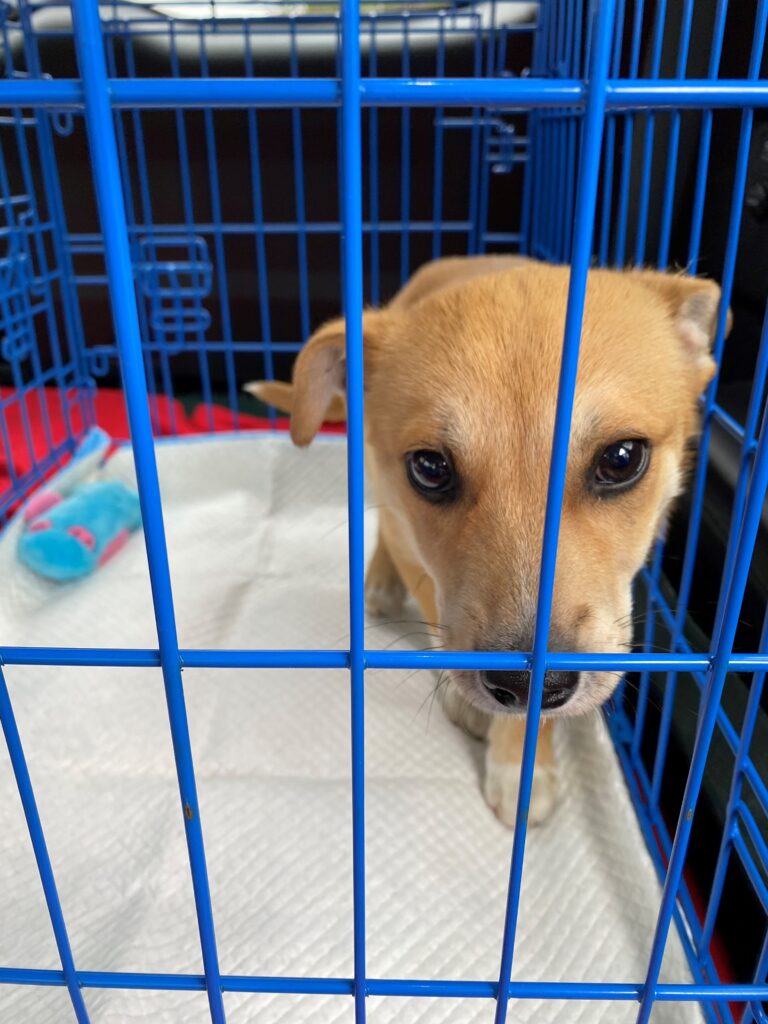
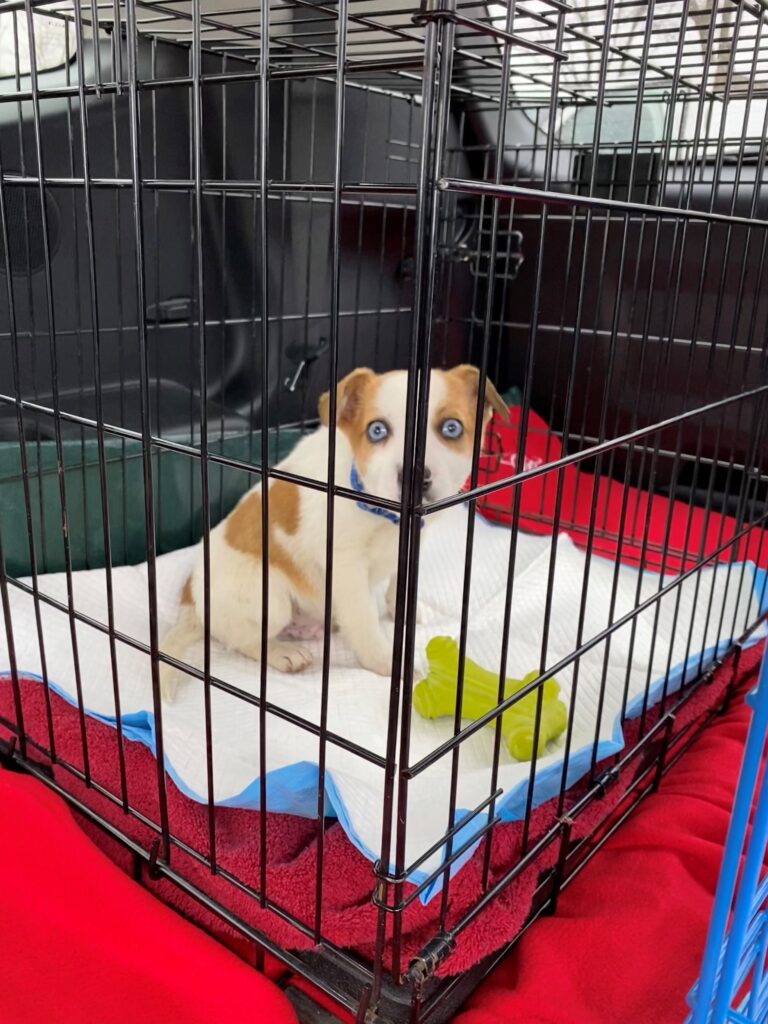
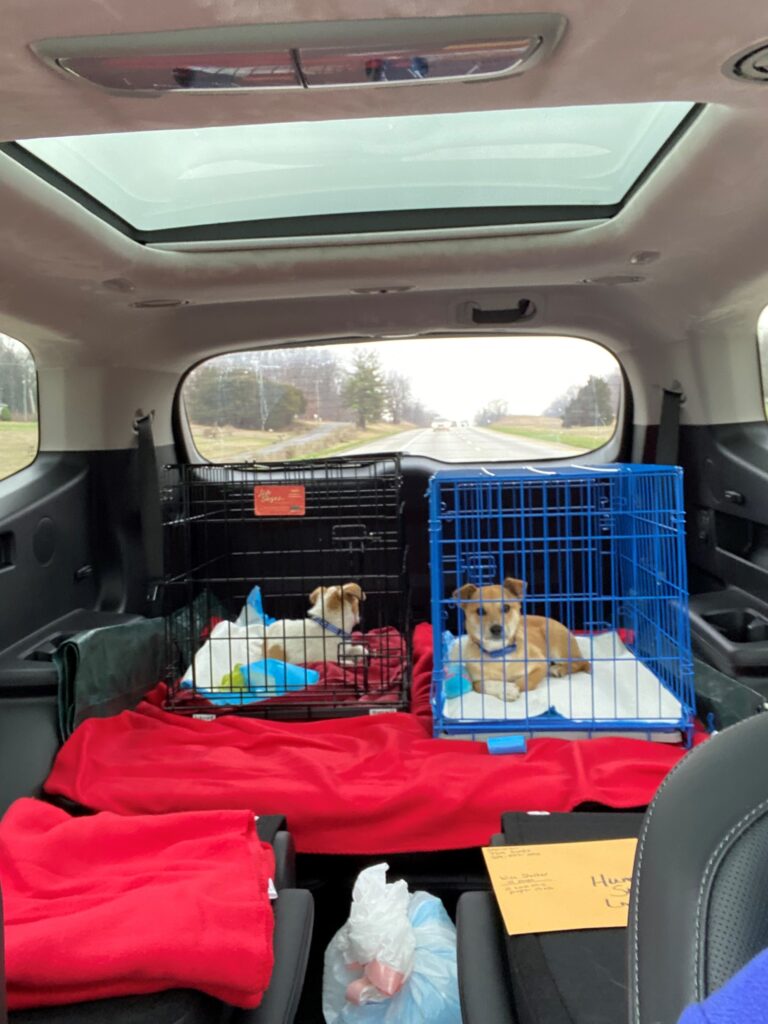
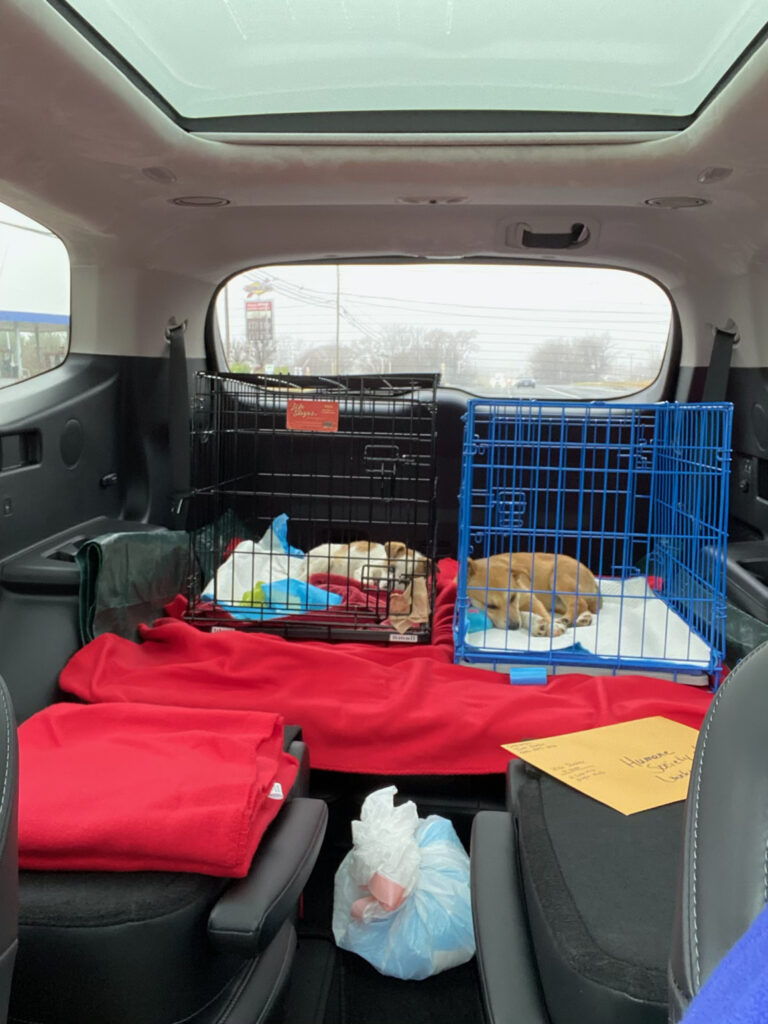
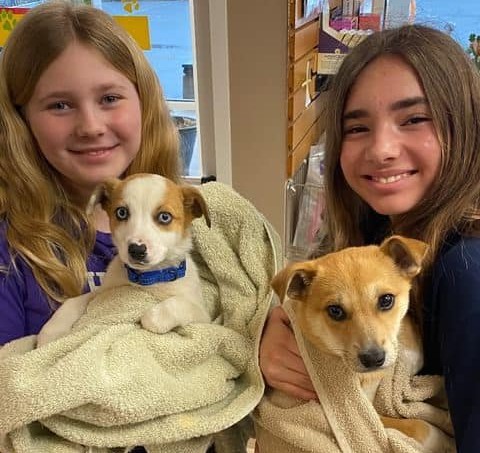
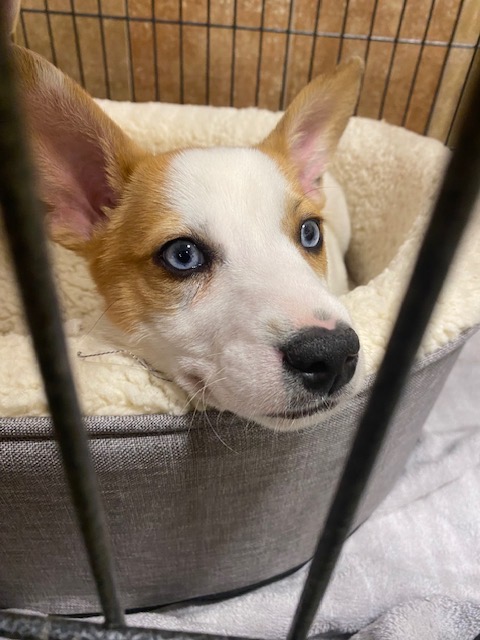
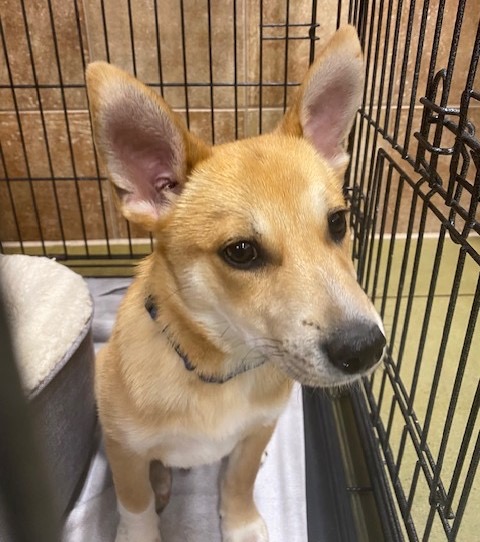
PUPDATE: Both Dip and Chip have been adopted! Special thanks to the volunteers and fosters who made their happily “fur-ever” after possible!

By Ayse Pirge
Will a tiny microchip really make it more likely to get your lost pet back? The answer is a resounding YES! According to a study by the American Veterinary Medical Association (AVMA), microchipped stray dogs were returned to their owners at more than DOUBLE the overall rate, including both microchipped and non-microchipped dogs. For stray cats, the difference in return rates was even more dramatic.
“A microchip is a permanent and unique identifier, and so I believe it is the single most important thing an owner can do to increase the chance that a lost pet will find its way back home,” Gina Addie, the HSLC Microchip Manager and Medical Supplies Coordinator says.
Updating your contact information is critical
“However, it is equally important for owners to remember to update the microchip registration whenever their address, phone number, or email address changes. If this information is not kept current, then a microchip is rather useless,” Addie adds. She also recommends asking your vet to scan for the chip on an annual basis to make sure it is still detectable by a microchip reader.

Microchipping is low risk
When asked whether pet owners should consider any possible risks associated with microchipping, Addie said that the hypodermic needle used is sterile, which “poses no more pain or risk of infection than any other injection (like vaccines, etc.).” Plus, no anesthesia is required. A microchip can be implanted during a routine veterinary office visit and is relatively inexpensive.
Indoor pets need microchips, too
Is microchipping necessary for indoor pets? Addie thinks that microchipping is as important for indoor pets as it is for outdoor ones, because any pet may unexpectedly escape the home.
“Children may run outside and leave a door open behind them. Or a service provider might come to the door causing a shy cat to panic and dash through the door when it’s opened,” Addie added.
“If you ever follow missing pet websites, you will see countless posts from people who have had this sort of thing happen. And, of course, they are frantic to get their pet back. A microchip greatly increases the chance that they will be reunited with their beloved fur baby.”
For further information on microchipping your pet, check out the American Veterinary Medical Association’s FAQ page. For more tips on preventing lost pets, read this HSLC blog.

Throughout the month of April, the Humane Society of Loudoun County has been running an awareness campaign called “Who are the Fosters in Your Neighborhood?*” The goal? To shine a well-deserved spotlight on our fabulous fosters and inspire others to join their life-saving ranks. Our fosters come from all walks of life and truly are…the people that you meet each day!
Here are just some of the fosters in your neighborhood…



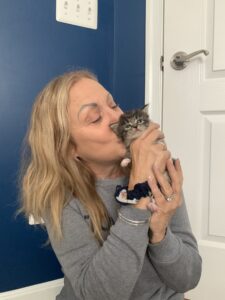

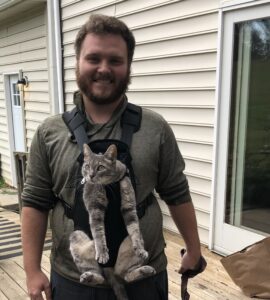
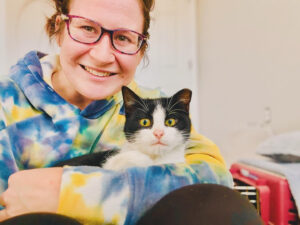



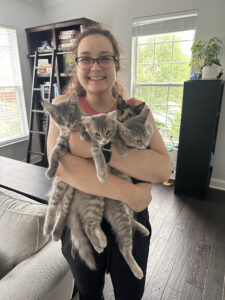
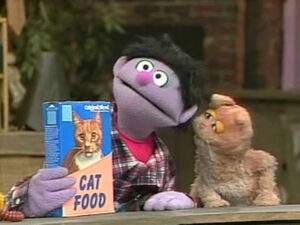
If you are thinking about giving fostering a try, our Animal Care Director and Foster Coordinator, Amy Richards, offers this guidance, “Reach out and ask questions by emailing us at foster@humaneloudoun.org. We are always happy to share experiences and advice. Yes, the goodbyes are difficult. But, go into it knowing that goodbye is the goal. We are the jumping off point into their new life.”
To learn more about fostering, visit our website. And, if you are ready to save a life, complete a no-obligation application online today!
*To catch up on our foster campaign and other updates, be sure to follow us on Facebook and Instagram.
